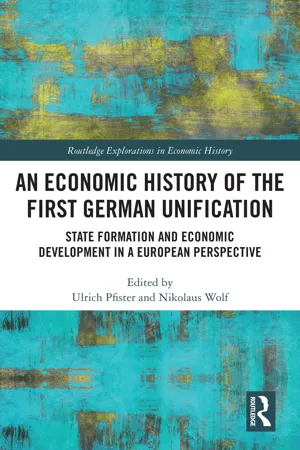
An Economic History of the First German Unification
State Formation and Economic Development in a European Perspective
- 378 pages
- English
- ePUB (mobile friendly)
- Available on iOS & Android
An Economic History of the First German Unification
State Formation and Economic Development in a European Perspective
About This Book
There is a striking chronological parallel between Germany's transition from a post-Malthusian regime to modern economic growth and the formation of a modern nation-state between the late 1860s and the early 1880s, which culminated in the events of 1871.The central question of this book is whether and how such state formation did in fact contribute to economic development.
Twenty chapters written by leading experts in their respective fields deal with various aspects of the book's main question. Together, they identify three channels by which national unification contributed to Germany's economic development: (1) Creation of a nation-state completed a process of institutional Unification of a large inland area and thereby increased the integration of domestic markets. (2) Unification raised the capacity of the political system with respect to regulating complex domains, such as stock companies, patenting, and social insurance. (3) The emerging political regime of market-preserving federalism promoted the quality of economic institutions. Moreover, a set of chapters dealing with the experience of other European economies apart from Germany during the second half of the nineteenth century highlight additional factors in nineteenth-century economic development, most notably the first wave of modern globalization and economic geography.
Readers interested in the history of state building and the economic history of Germany and of Europe in general during the age of industrialization and globalization and students of the economic effects of political integration and decentralized state growth will all gain much from this book.
Frequently asked questions
Table of contents
- Cover
- Half Title
- Series Page
- Title Page
- Copyright Page
- Table of Contents
- List of contributors
- Acknowledgements
- 1 Introduction
- Part I Nation formation and the evolution of economic policy
- Part II The formation of the nation-state as a structural and institutional turning point
- Part III Economic development and economic institutions in early Imperial Germany
- Part IV State and economic development in a European perspective
- Index